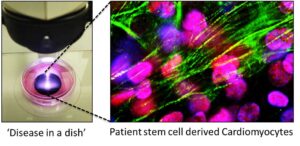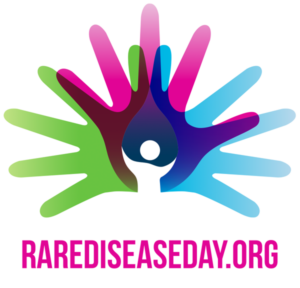Principal Investigator Dr. Sanjiv Dhingra (third from left) and his research team.
February 26, 2021
Terms like Leigh, Kearns-Sayre, and MELAS (Mitochondrial Encephalopathy, Lactic Acidosis, and Stroke-like episodes) seldom make the news.
Yet children born with these rare metabolic disorders often do not survive into adulthood and there are no effective treatments.
St. Boniface Hospital researchers are testing new targeted drug therapies that might help.
In Dr. Sanjiv Dhingra’s laboratory, his team reprograms affected patients’ blood cells to behave like stem cells. The team is creating patient-specific models to test the efficacy and safety of new drugs for potential life-saving treatment options for such rare conditions as Leigh Syndrome.
 “The approach is both important and exciting,” said Dr. Dhingra. “By creating a ‘disease in a (culture) dish’, we can safely test new drugs for effectiveness and toxicity on human cells, without the necessity of administering them to patients.”
“The approach is both important and exciting,” said Dr. Dhingra. “By creating a ‘disease in a (culture) dish’, we can safely test new drugs for effectiveness and toxicity on human cells, without the necessity of administering them to patients.”
Because so few people are affected by these conditions and their mutations, there doesn’t exist a large enough pool of volunteers to often conduct clinical drug trials.
“Our work accelerates the process so drug developers can more accurately target the most suitable patients for participation on the basis of what has already proven helpful in the lab,” Dhingra explained.
Working with Shared Health’s Metabolic Program at Health Sciences Centre Winnipeg and in collaboration with Dr. Cheryl Rockman-Greenberg, Dr. Dhingra hopes to find more-effective, patient-specific treatment options for these rare metabolic disorders. 
Leigh Syndrome occurs at a rate of approximately 1 in 40,000 births worldwide. However, it has a higher prevalence in the Mennonite population in Manitoba due to a mutation.
One in 20 people will live with a rare disease at some point in their life. February 28th is Rare Disease Day around the world. From its inception in 2008, Rare Disease Day has taken place on the last day of February, a month well-known for having a “rare” number of days.
Donate today to help scientists like Dr. Dhingra unlock the mysteries of rare diseases.


